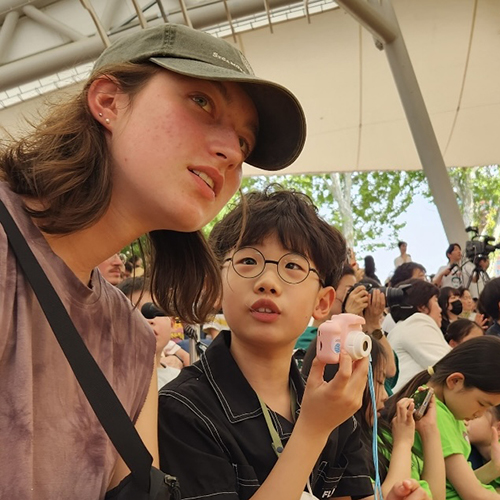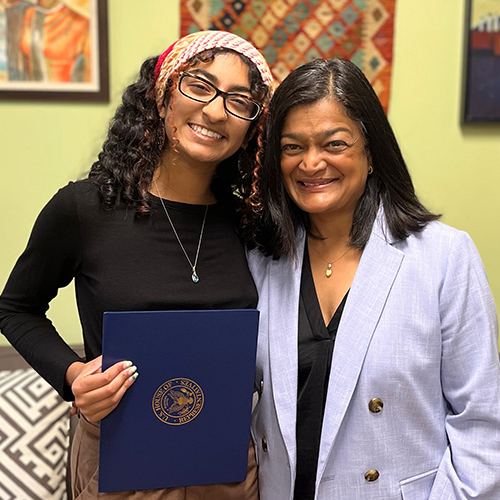H. Stewart Parker (BA ’79; MBA ‘81) doesn’t do things halfway.
Tapped to head the biopharmaceutical company Targeted Genetics in 1989, Parker served as president and CEO for nearly two decades—a rare tenure in a notoriously volatile industry. And since joining the UW College of Arts and Sciences Board ten years ago, she has remained an active member. In September, she became chair of the board.
“I love the College of Arts and Sciences,” says Parker. “I’m an unabashed believer that the liberal arts provide a base from which you can do anything—assuming you’re taking all that the liberal arts has to offer.”

Parker speaks from experience, having parlayed degrees in Russian and business into an impressive career in the biotech industry.
When she arrived at the UW as a transfer student, Parker’s love of Russian literature led her to the Department of Slavic Languages and Literature. She lived in Russian House, even briefly serving as the house’s manager. “There was lots of drama,” she recalls of her time as manager. “It was like living in a Dostoyevsky novel.”
Parker went on to earn an MBA from the UW’s Foster School of Business, and then took a job with a newly formed start-up company called Immunex. In fact, she was the company’s first hired employee, brought on by the three founders to handle day-to-day business activities including market research and facility coordination.
“Biotechnology really wasn’t around then,” Parker recalls. “Immunex was one of the first companies in the field.”
As the company expanded, so did Parker’s role. Within a few years she was promoted to director of marketing and communication and then vice president. When Immunex formed Targeted Genetics in 1989 to develop gene and cell therapy treatments, Parker was asked to head the new division.
Targeted Genetics became a separate entity in 1992, growing to as many as 170 employees in the years that followed. Parker’s success as CEO was recognized by the U.S. Small Business Administration, which named her Western Washington Small Business Person of the Year in 2001.
Parker credits her success, in part, to her liberal arts education. “I had to do a lot of translating in my work—translating science to business people, translating business to scientists,” she explains. “That required a good ability to listen, which I developed as a student in Arts and Sciences.”

The irony is that Parker barely experienced the sciences as a student, limiting herself to an introductory geology course. But after spending years surrounded by scientists, she has become a self-described science junkie. “I like the way you have to think in science,” she says. “You ask a question to get to the next question, and the next one, and the next one.”
Last November, Parker resigned from Targeted Genetics, ending an exceptionally long run as CEO. “I felt like I was the oldest living Confederate biotech CEO out there,” she jokes. After an initial adjustment, she’s enjoyed the break from work. “Since leaving the job, my goal has been to say ‘yes’ to every opportunity that’s come along,” she says, “from learning how to quilt, to helping run cattle at a ranch in Montana, to taking a trip to Russia and Mongolia. It’s been an opportunity to do things I haven’t had time to do.”
That includes taking on the role of Arts and Sciences Board chair. Given the current economic climate, Parker’s business acumen is particularly welcome right now. To flourish in the biotech sector, Parker had to be extremely creative about finding money. She believes the same skills are critical to weathering the storm in academia.

“The University needs to be creative,” says Parker. “We need to be innovative in the how we teach and how we fund programs. And we’ve got to do a better job of educating our governing bodies about the impact higher education has on society.”
While Parker plans to help with these efforts, she’s also pondering the next step in her own career. She’s certain she’ll return to work, but she doesn’t know when or where.
“I know I’m not done, but that’s all I know,” she says, without a hint of concern in her voice. “We’ll just have to see.” She adds with a grin, “It’s going to be interesting.”
More Stories

Finding Family in Korea Through Language & Plants
Through her love of languages and plants — and some serendipity — UW junior Katie Ruesink connected with a Korean family while studying in Seoul.

Celebrating Contemporary Indigenous Music
Markus Teuton, a musician and citizen of Cherokee Nation, explores contemporary Indigenous music through his academic work and as host of “Indigenous Jazz,” a radio show.

Learning Hard Truths Through Internships
Sana Shetty, interested in human rights law, has a more nuanced understanding of potential careers thanks to internships.